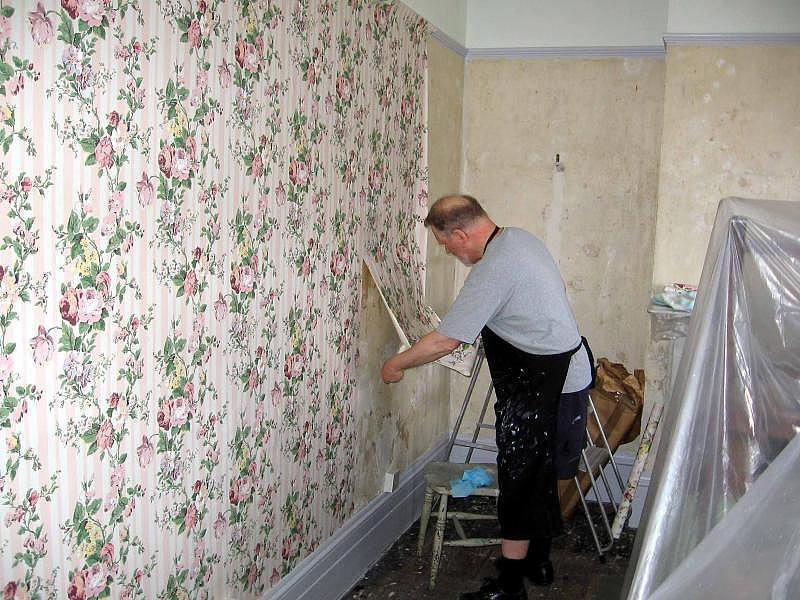Let my wallpaper ordeal be a lesson: Specialize to find those deep stories

Not the real Bill Heisel.
We had some wallpaper drama at our house recently.
The wallpaper hanger arrived in a mood. That meant nothing was right nor could it easily be made right. The job we thought would be complete before Thanksgiving now was going to be pushed back beyond the holiday. To hurry things along as fast as I could, I spent Thanksgiving Day spackling, sanding, taping and priming.
A contractor friend of ours said, “You can’t tick off the wallpaper guy. They’re too hard to find.”
This all was happening while I was getting ready to give a guest lecture in a journalism class, and I wish I had a picture of the drywall dust in my hair, the paint on my hands, the stains on that pair of pants I shouldn’t have been wearing at the time. Wallpaper prep is not my specialty. Nor is wallpaper hanging. Those are two distinct skillsets. The experience was a reminder to me that when I was in J-school, we talked a lot about knowing the topic of moment and moving on, of becoming an expert for the day, of being a good generalist in order to be able to move from beat to beat as the news of the day demanded. But generalism only goes so far. Yes, your top skills will always be your ability to listen, to learn quickly, and to put together a story quickly. But if you are thinking about going into investigative reporting, you should also think about specializing. Be the best damn wallpaper hanger you can be.
This doesn’t mean that you have to choose one area of expertise and stick with it for life. It does mean that you should think now about the types of things that interest you and start to build your knowledge base in those areas. As I wrote about recently, my interest in health started early. I was just an intern at the Mexico Ledger in Missouri when I found a story about the Americans with Disabilities Act that I thought deserved attention. That early interest in health carried through my entire career, helping make me a health generalist. It also started me down the path of specializing.
I became very interested in regulation. I didn’t know how to correctly articulate it at the time. In fact, it was several newspaper jobs later before an editor at the Orange County Register, Jeff Light, voiced the investigative formula that really crystallized what I had been trying to do in story after story: “How is it supposed to work, and how is it actually working?” The distance between the two is your story.
What I was trying to report on was the structure of rules that had been set up to protect our health and our safety, and how those rules were being enforced, not enforced, or subverted. Often, the rule-makers and enforcers were my real subject. So, I was gradually finding and mining a subspecialty inside of a subspecialty. That interest has taken me into operating rooms and cattle pens, into medical board hearings and candy shops, into living rooms and funeral parlors.
Your specialized interest may be in something that relates to your personal experience. You might have experienced something in your life that makes you interested in mental health and how we as a society address depression, anxiety, schizophrenia, and other conditions. You might be drawn to problems related to children. You might care more about people nearing the end of their lives.
Use that personal interest to propel you.
If you’re just starting out, begin with your internship. I wish I could say that I was smart enough to know to do this during that stint at the Mexico Ledger, but, in fact, I was just covering my beat, which was a mix of school boards and city councils. When I saw the potential for a bigger story, though, I jumped at it. And I was lucky enough to have an editor, Larry Nossaman, who encouraged me to do so.
You can’t determine at the outset that your boss will be supportive and encouraging, but you can work to develop the best idea possible. Put that story together, get it out into the world, then follow the threads that extend from it.
Return to that theme at least once during your internship. Then pick up the thread at your next job. If you can’t find a story that is exactly connected to your budding specialty, you can still do the work to stay in touch with the network that you have built, the sources, the paper trails and the online resources. And you can fold that knowledge into other stories that intersect with your themes.
You will slowly be building a brand for yourself as a specialist, and people will start to come to you with stories. That, ultimately, is what will make you more indispensable to your future employers. You are the person who always has good stories in development. That’s all a media company (nonprofit or for-profit) wants. Well, that and the ability to complete and publish at least some of those stories.
Whether you are hanging wallpaper to such a state of perfection that not a seam or wrinkle can be found or you are telling a story about the shortsighted business decisions that led to the collapse of a much-needed rural hospital, you can make yourself into the essential reporter who is so hard to find. And that will lead to a long and happy career.

